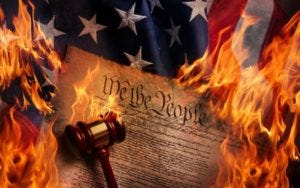For the past year and half, one of the big concerns among genuine conservatives, in their observations of Donald Trump, has been his perceived contempt for the First Amendment of the U.S. Constitution.
It's one thing for an individual to object to, and aggressively condemn speech that they believe is unfair or dishonest; Trump did this many times with the news media throughout his successful presidential campaign. It's an entirely different thing, however, to propose penalties against those whose speech you don't like, as Trump has also done.
Back in February, he said that, as president, he would change U.S. libel laws so that he could more easily sue news organizations if he deemed their reporting to be "purposely negative and horrible and false" toward him. He has since repeated that plan a number of times.
Throughout the campaign, Trump called for the firing of news figures whose remarks he didn't like, including Karl Rove, Charles Krauthammer, Katy Tur, and Sopan Deb. He said National Review's Rick Lowry shouldn't be allowed on television. He repeatedly told his Twitter followers to boycott Megyn Kelly's Fox News show because of the host's criticism of him. He added that Kelly shouldn't be allowed to moderate presidential debates.
Trump hasn't limited his vilification of the media to individuals or even specific outlets. He has, by and large, branded the entire news industry (except those who reliably sing his praises) as being corrupt and dishonest.
Now, there's undoubtedly a lot of corruption and dishonesty in the news media; examining it has been a key focus of this website (and the man who owns it) for years. But time after time, Trump has displayed a belief that negative coverage of him is, in itself, illegitimate.
During the campaign, some were comfortable in writing off these incidents as harmless political hyperbole, or the undisciplined emotional responses of a passionate man. But now that Donald Trump is the president-elect, his views on our constitutional freedoms certainly matter. And if there were any doubt of what he truly believes about the First Amendment, his tweet from this morning should serve as a clarification:
"Nobody should be allowed to burn the American flag - if they do, there must be consequences - perhaps loss of citizenship or year in jail!" -- Donald J. Trump
Most Americans (including myself) find the act of burning our nation's flag to be disgusting and worthy of fierce condemnation. I don't like it, and my guess is that a lot of people would be perfectly fine with it being made illegal.
But the First Amendment (which protects flag-burning as a form of protest) wasn't put in place to defend popular displays of free speech. It was designed precisely to protect offensive and unpopular speech.
Among those who understood this was the late Justice Antonin Scalia (the man Trump says he'll model our next Supreme Court nominee after). Back in 1989, Scalia voted with the court majority to protect flag-burning under the First Amendment.
One of the big ideological differences between conservatives and liberals is that if a conservative doesn't like something, they'll simply avoid it. However, if a liberal doesn't like something, they'll demand that it be banned, so that there is no choice but to avoid it. Donald Trump, of course, is no conservative (a proclamation I used to receive fierce resistance to from his loyal fans, but not so much these days). Thus, it's not in his instincts to cherish and respect individual freedom the way a lot of us do.
Trump will, however, be our next president. Early next year, he'll be sworn into office with an oath to "preserve, protect and defend the Constitution of the United States." And today, as the president-elect and the leader of the Republican Party, he voiced a desire to actually jail or renounce the U.S. citizenship of a person for exercising their First Amendment freedoms.
If you're a member of the political Right (where people proudly self-identify as constitutional conservatives), that should probably concern you -- a lot; it certainly would if Obama had said it.
Then again, I've been amazed over the past year and a half at what we're now willing to accept, embrace, and even normalize on this side of the political divide.



